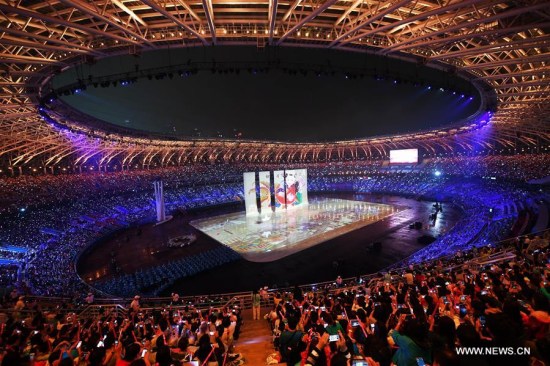
Photo taken on Aug. 27, 2017 shows the performance during the opening ceremony of the 13th Chinese National Games in north China's Tianjin Municipality. (Xinhua/Zhao Ge)
The Chinese version of the Olympic Games, known as the National Games, is interwoven with the larger story of Chinese sports. The 13th National Games opened in Tianjin is destined to be a historic installment. It is held at a moment when the world's second largest economy is undertaking a wide-ranging reform push in the area of sports, in a bid to help its people enjoy healthier and happier lives.
"National Games for a Healthy China" is the slogan of Tianjin 2017. It illustrates a shift in China's focus away from an all-or-nothing pursuit of Olympic and World championship gold medals and toward a more balanced attitude about the fundatmental function of sports in wider society.
One major change will see the National Games open its doors to amateur athletes for the first time in 30 years, drawing over 8,000 amateur finalists to compete in 19 popular events such as taichi, chess, roller skating, marathon and rock climbing. This is in addition to the over 10,000 professional athletes entering in the Olympic events.
The move has served a dual purpose: it has made Tianjin 2017 the most well-attended National Games in history, but more importantly, it also underlines the country's determination to be both wealthy and healthy, or what is known in Chinese as a "xiao kang" society. While this Chinese phrase translates to "well off" in English, the word "kang" literally means "good health".
The country will continue to adore its Olympic heroes as always, which has been the case from the moment that China began its Olympic journey in search of national pride and confidence when it returned to the Olympic family in 1979, all the way to the present day, as China prepares to host its second Olympics in 2022 after Beijing 2008. Now the country regularly wins gold medals on the world stage, filling its people with pride, uniting them under one purpose: making the most out of all the beautiful things that sports has to offer to people.
The National Games will likely keep functioning as a link in the state-sponsored sports system, which mobilizes resources all over China to scout, train and select sports talents and elevates the very best to the national teams.
However it is impossible to ignore the fact that the whole sporting system has previously come under criticism: several scandals have stemmed from the extreme focus on gold medals, which had the effect of distancing sports from the general public.
The changes did not happen overnight. But when they did occur, they began to put the country on a stronger footing by allowing it to put sports in perspective.
A government guideline unveiled in late 2014 (one year after the 12th National Games in Shenyang, Liaoning) pushed for accelerating the development of the sports industry and boosting sports consumption. This was followed by policies including the milestone soccer reform led by Chinese President Xi Jinping, which promised more sports facilities, easier organization of competitions, favorable policies for sports-related businesses and emphasized on-campus sports.
The reform is two pronged: it aims to create a "Healthy China" while at the same time tapping the massive economic potential of the sports industry -- setting a goal for the sector to grow into an industry worth 800 billion U.S. dollars by 2025. The changes are having an effect from the top down as well as from the bottom up. Around the time the government launched the policies, grassroots sports came to life and developed with a rapidity that exceeded every expectation.
One particularly telling example is the marathon fever that has gripped the country: the number of marathon races held in China ballooned from 22 six years ago to an estimated 600 in 2017, attracting some 5 million participants. Running, hiking and skiing have become popular among people of all ages while bodybuilding, square dancing and other sports are also on the rise. If all goes as expected, the country of 1.3 billion will have 435 million people regularly taking part in sport by 2020.
When the inaugural National Games was held in 1959, the country called to "develop sports to improve the fitness of the people" when China was rebuilding itself after years of ravaging war. More than half a century later, the push to encourage healthier lifestyles is boosting national confidence. The National Games has pride of place in China's overall sport reform effort that seeks to, above all else, put the people and their well-being first.


















































